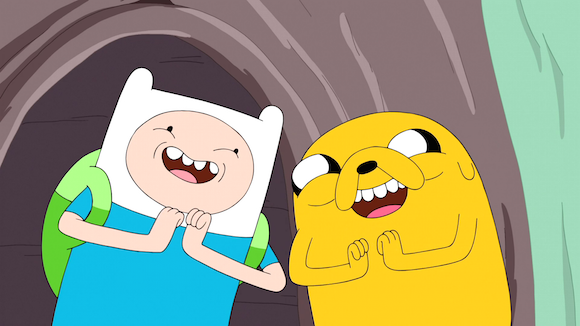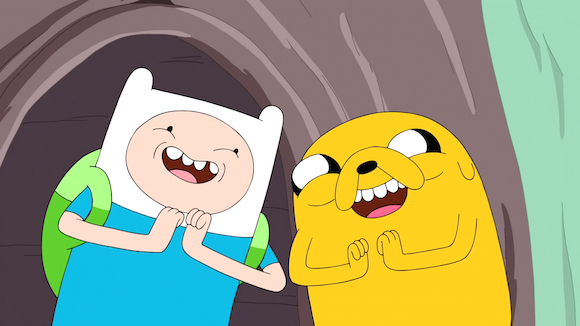

Why the ‘Adventure Time’ Peabody Award is Important for Animation

Last week, the 2014 Peabody Awards recognized CNN’s coverage of the kidnapping of the Nigerian school girls, NBC/MSNBC’s coverage of ISIS, the podcast Serial for its investigation into the murder of Hae Min Lee, and Adventure Time.
The Cartoon Network program was praised by the Peabody Board for its “uniquely imagined, truly odd fantasy world”, which “entertains even as it subtly teaches lessons about growing up, accepting responsibility, and becoming who you’re meant to be.”
To some, Adventure Time may seem like a kooky standout in the austere company of news and documentary programs, but the Peabody Awards—which has honored distinguished public service across radio, television, and online since 1940, and also awarded Disney Junior’s Doc McStuffins series for its inspiring storytelling last week—has a long history of appreciating and championing animation, as far back as Walt Disney’s Disneyland (1955) and Wonderful World of Color (1962).
Since then, the Peabody Board—composed of media industry professionals, media scholars, critics, and journalists, and renowned for its rigorous judging process—has continued to recognize the unique and profound powers of animation that other awards events, and even the culture at large, routinely and egregiously overlook.
Partly this would appear to be because, unlike other awards committees who segregate animated works as if they belonged to a single genre, the Peabody Board’s sole judging consideration is overall excellence. With a catholic commitment to championing quality contributions to culture regardless of form, it’s no wonder that animated works regularly rise to the top.
When a Peabody was awarded for What Have We Learned, Charlie Brown? (1983)—a television special in which the Peanuts gang pass through WWI and WWII sites—Charles Schulz was vindicated in his belief that “the characters of Charlie Brown, Linus, Snoopy and the others were close enough to being real to handle delicately a subject that other animated characters would destroy.”
But, as the Adventure Time award illustrates, it’s not just poignant or educational fare that the Peabody Board notices when it comes to animation: A Charlie Brown Christmas was awarded in 1965. More recently, in 1993, Steven Spielberg’s Animaniacs was awarded for “restoring quality to the daily animated television series”, and, in 1996, The Simpsons was honored “[f]or providing exceptional animation and stinging social satire, both commodities which are in extremely short supply in television today”, as well as its representation of a “nuclear family trying its best to hold together under the relentless pressures presented by modern life.”
And one of the most glowing citations for an animated work has been for the series South Park, which received a Peabody Award in 2005:
“No aspect of modern society is exempt from the scathing satirical campaigns mounted by the raucous children of South Park. Institutions, individuals, and ideologies—all are targets … In the process of unapologetically ridiculing individuals and groups, the series pushes viewers to confront broader issues such as racism, war, mob mentality, consumerism, and religious fanaticism.”
In his acceptance speech, Trey Parker said: “When Matt and I started making South Park we asked ourselves two questions: ‘What is social responsibility in broadcasting?’ and ‘How can artists provoke a call for change?’”—at which point the audience erupted into laughter—“Why is that so fucking funny?”
The following year, the Peabody Award recognized The Three Amigos HIV/AIDS Prevention Program, in which the characters Shaft, Stretch, and Dick—three anthropomorphized condoms—remind viewers of the importance of prophylactics in reducing the spread of HIV/AIDS.
And, in 2011, a Peabody was awarded to the oral history project StoryCorps 9/11, an initiative to memorialize the personal accounts of friends or family members of those who perished in the 9/11 attacks, including through animated shorts directed by the Rauch Brothers.
Hopefully, in years to come, other prestigious awards committees will follow the example of the Peabody Board in regarding animation with more serious consideration alongside other forms of storytelling. Until then, the Peabody Awards will continue to shine a light on the sensitivity and sophistication of a diversity of animated works. And maybe, just maybe, get more people tuning in to Adventure Time.

.png)